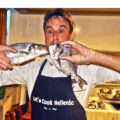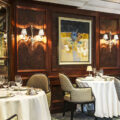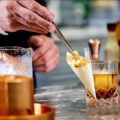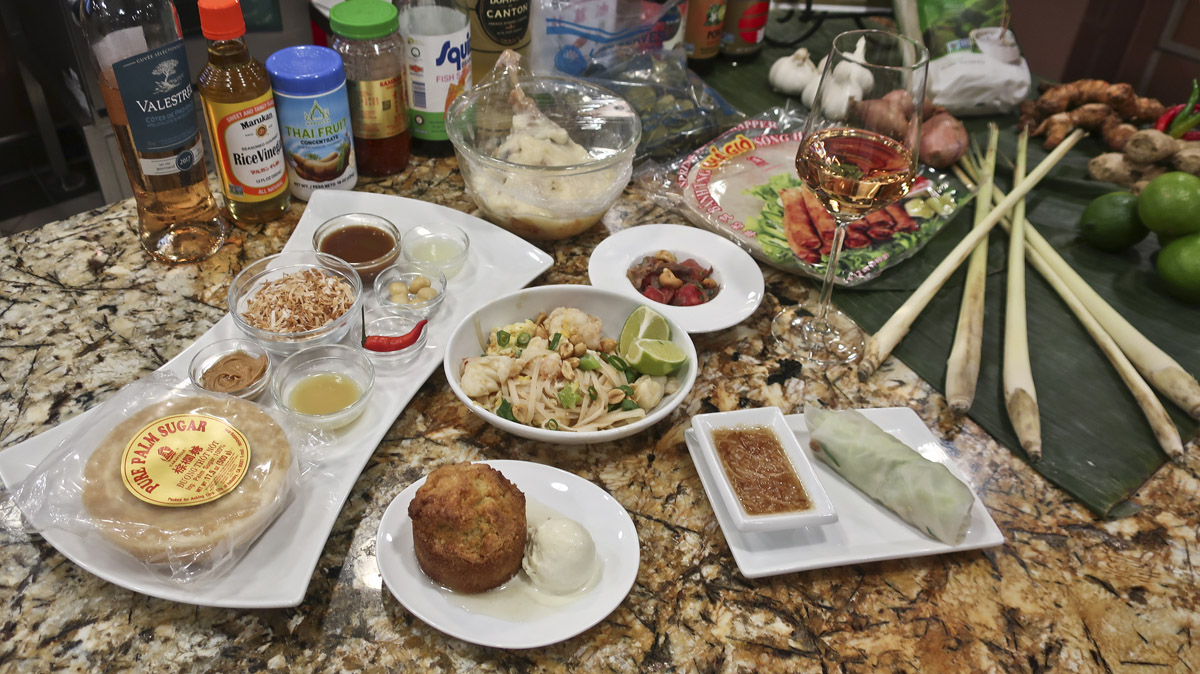
With Executive Chef Kathryn Kelly leading the kitchen, you know there’s going to be a good meal ahead. She trained with French master chef Jacques Pepin, was formerly an executive at The Culinary Institute of America and has spent a decade on Oceania Cruises running a tight ship in The Culinary Center.
Today, it’s our turn. While cooking classes on other cruise lines often consist of watching a chef on stage do the slicing, dicing and frying, Oceania’s Culinary Center kits you out at a work station with a stove, sink and a full set of knives and spatulas. Even if you believe you’re an ace in the kitchen heading in, I guarantee you’ll come away from a class with a few valuable pro tips and added confidence in your epicurean prowess.
There’s a different theme each day and today’s is the most requested dishes in the popular Red Ginger pan-Asian restaurant aboard Oceania’s Riviera.
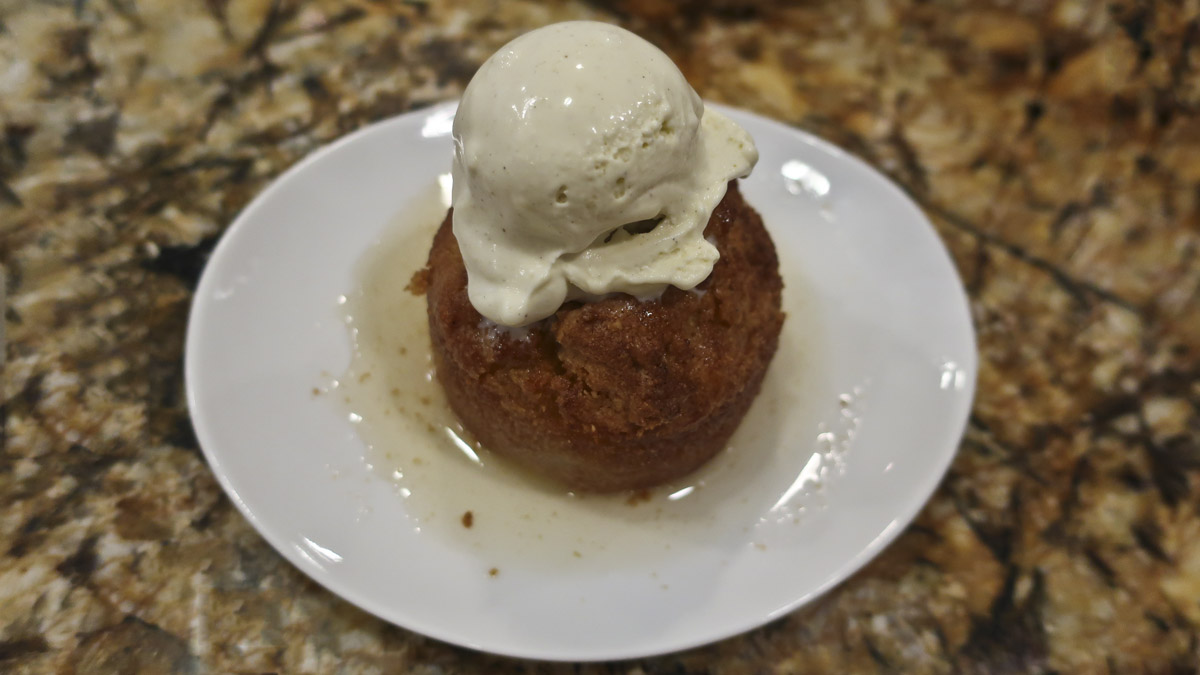
Dessert comes first
We gather around the front stage of the classroom where Chef Kelly demonstrates the techniques of each dish before sending us back to our work stations to emulate her technique. We start with a ginger cake that will bake while we make the rest of the meal.
It’s a matter of breaking an egg and whisking it together with a mix of almond flour and all-purpose flour, some baking powder and butter (at room temperature) before adding sugar and vanilla. That seems straightforward enough, right?
But Chef Kelly adds some advice: make sure the baking powder is fresh–no more than three months old–so the dough will rise well. Whip together the flour and baking powder and form a well in the bottom of the bowl before adding the egg and other liquids to ensure they blend evenly into a fluffy batter.
Before putting the batter it into buttered ramekins for baking, another chef’s tip: butter a couple of long one-inch wide strips of parchment paper and criss-cross them inside the cup with their ends sticking above the edges. They make for handy tabs to easily lift out the freshly baked cakes that then get lowered into a dish filled with ginger sugar, water and brandy. We’ll let the cakes sit and absorb the liquid while we move on.
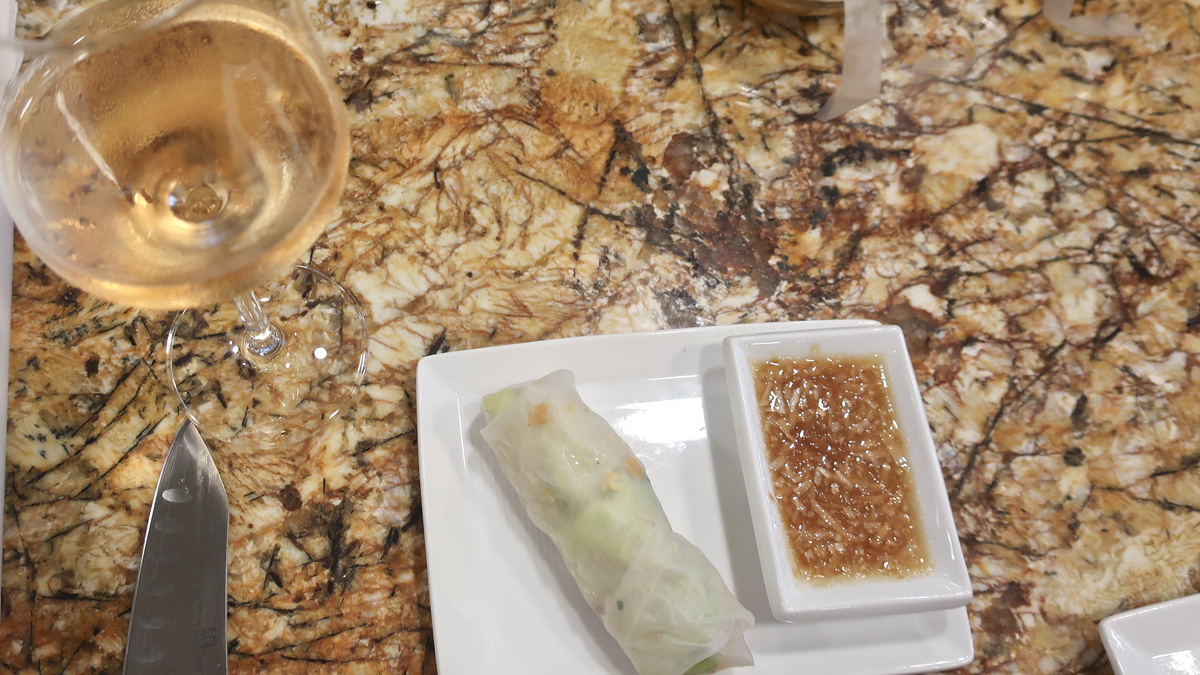
A spring roll for any season
Next up, Vietnamese spring rolls wrapped in banh trang rice paper, an appetizer for the meal that seems like a simple thing, but there are tricks to a perfect prep.
We need to slice segments of pomelo from their skins, mince shallots, basil and mint and roll tender lettuce leaves around chive stems. Chef Kelly starts with some knife safety tips: When cutting ingredients, curl your fingertips under to avoid clipping a pinky and when mincing, keep the tip of the blade on the cutting board for more control.
Next we wrap the fillings in softened rice paper. Timing is all important. Leave the stiff wrapper in warm water only until it starts to yield; it needs to be pliable but not too soggy, so it holds together as you wrap the ingredients placed in the center like a present, one flap at a time.
Duck! And dice that watermelon
Preparing a duck confit and watermelon salad gives a new meaning to dicing. We’re instructed to slice a slab of ripe watermelon into dozens of precise cubes each somewhat larger than the size of something you’d roll in a board game. With the ultra-sharp blades we’ve been issued, it’s a snap to cut straight lines and then make identical accurate cross-cuts.
The melon cubes are mixed into a blend of pulled and shredded duck confit that’s been marinated with hoisin, chopped mint and basil. Then comes a topping of cashews and drizzle of chili-infused honey. Yum. But we can’t eat yet, there’s still the main course to whip up.
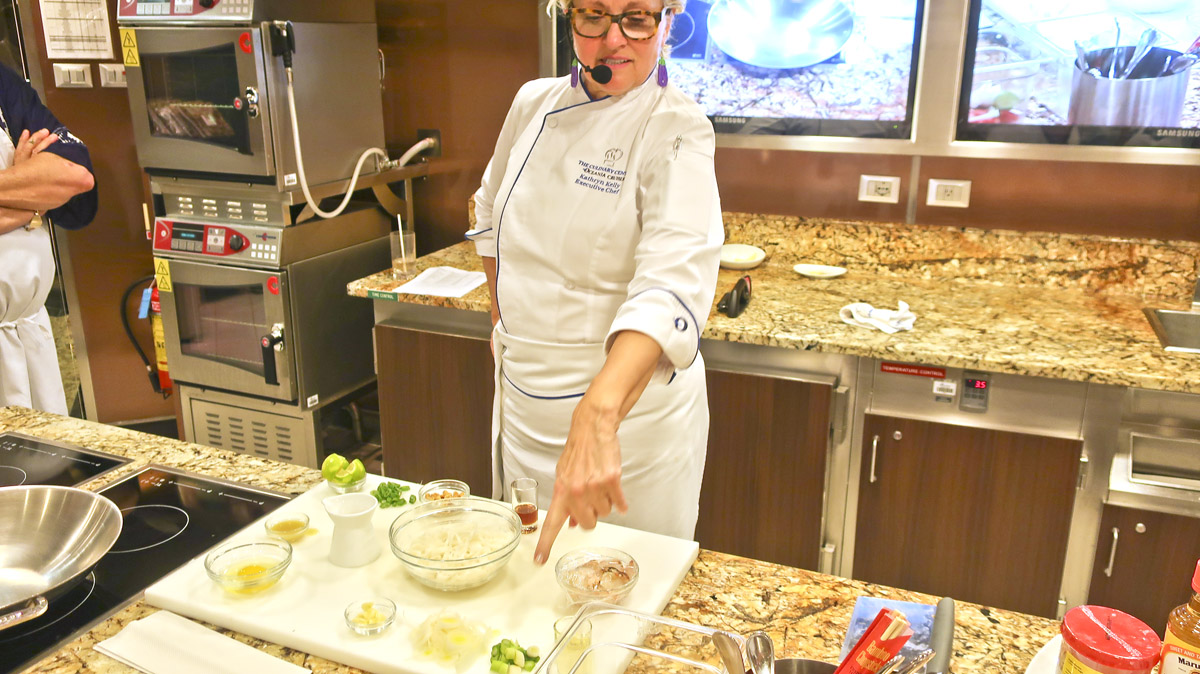
And pad Thai in a precision drill
Now the main event: wokking up a lobster pad Thai. For this we learn the drill necessary to make for success every time. There are a dozen ingredients that have to be added in a sequence. Having to hunt for one can spoil the speedy timing of the cooking and alter the taste out of the finished dish.
Before we start, Chef Kelly has us set out the dishes containing each ingredient, from oil, scallions and leeks to noodles, limes and peanuts in a precise grid on the chopping block. Just like in a working kitchen as she calls off each ingredient, we’re to reply “Yes, chef,” if we have them in the correct order of preparation.
We have to heat the oil first and fry the vegetables and pile them high up in the wok before searing the lobster. It’s a ballet of movements to make sure the lobster is cooked on all sides—and it doesn’t take long– before adding the noodles and sauce to warm before mixing and serving into bowls.
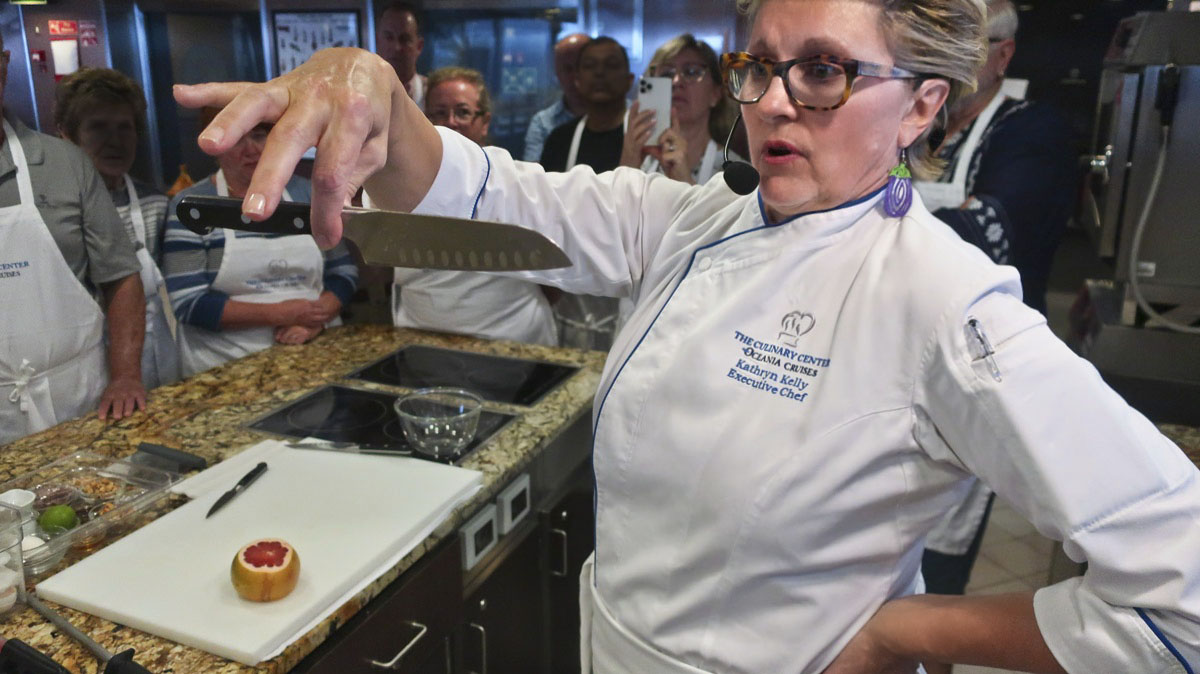
Practicing knife skills
This class includes a truncated version of what is offered as a full length course in knife skills and kitchen safety in the Culinary Center. Chef Kelly demonstrates how balance is essential: finding the knife’s midpoint will help you cut swiftly and accurately.
She even shares tips on sharpening the knives to a surgical edge. Dull knives are dangerous to cut with because they have a tendency to slip. The knives and sharpener we’re using are from the professional blade maker J.A. Henckels and Chef Kelly finds eight-inch knives can be a good choice for almost any cutting task.
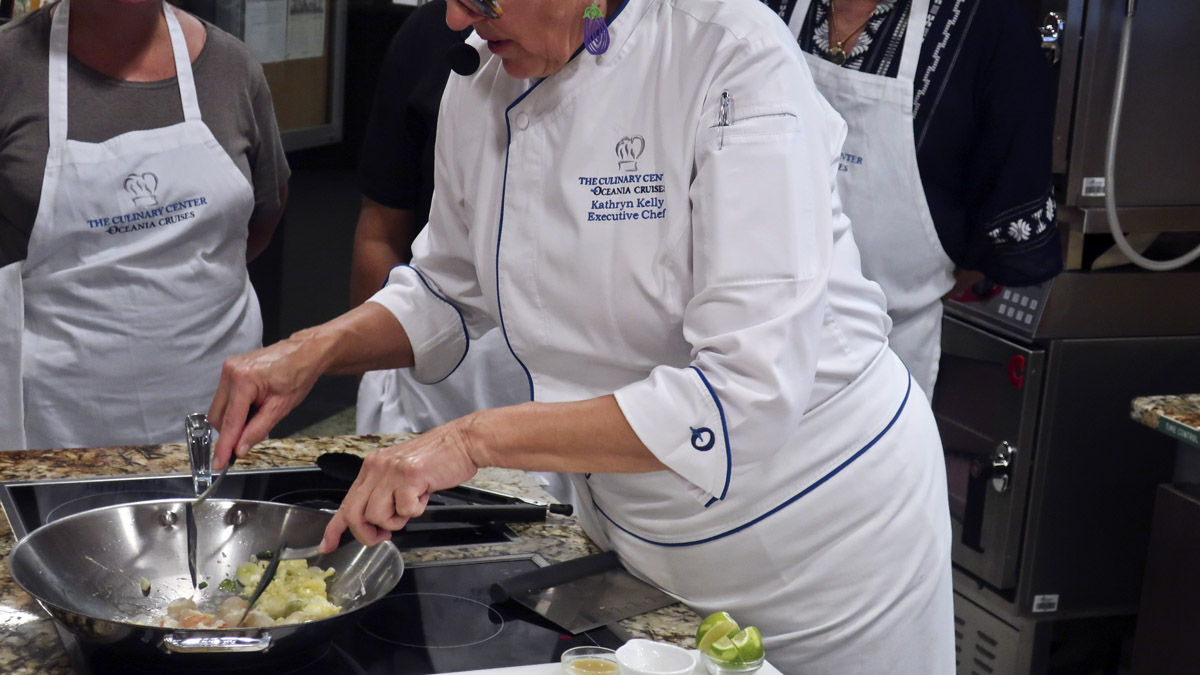
Class is over, but not dismissed
After two hours, it’s time to eat what we’ve cooked and we’re rewarded with glasses of wine and a toast to a meal perfectly prepared. The only thing is: it’s just two hours before dinner time and we’ve made a full four-course meal that’s so tasty we eat everything.
Oh well, so I’ve spoiled my appetite, I’ll enjoy my own – scrumptious I must say–cooking and a show instead this evening. On Oceania Cruises, there’s always a chance to let someone else do the cooking tomorrow.
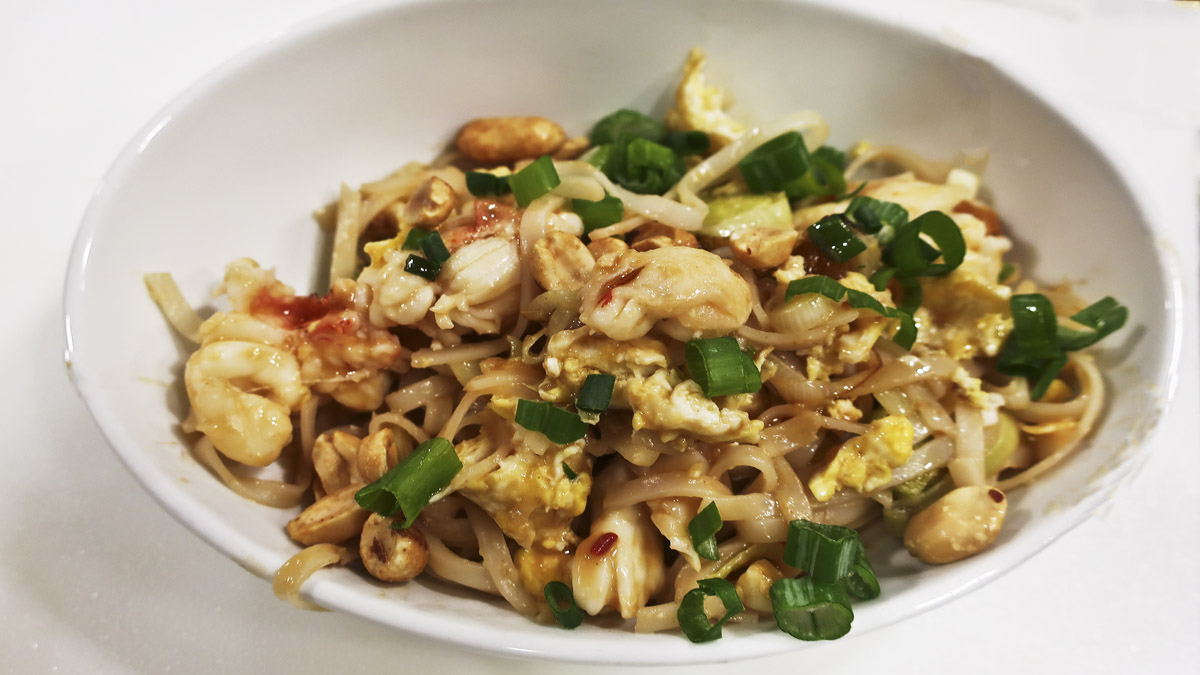
Ready to try your skill at home? Yes, chef!
The Culinary Center courses come with booklets of recipes to take home. Here’s the recipe for a Red Ginger restaurant all-time favorite: miso-glazed Sea Bass. It uses maple syrup rather than the traditional palm sugar:
Miso-glazed Sea Bass, Serves 2
½ cup white miso
2 tablespoons maple syrup
2 tablespoons mirin, sake or plum wine
½ teaspoon toasted sesame oil
2 6-ounce Chilean sea bass (or black bass or halibut) filets
In a small bowl, combine the miso, syrup, mirin and sesame oil and stir into a thick glaze. Brush the fish with the glaze and marinate at room temperature for one hour.
Preheat the oven to 450 F (204 C). Prepare a sheet pan with an elevated wire rack. Place fish on the prepared pan and bake to the desired internal temperature. Watch carefully to ensure the glaze does not burn. Serve immediately.
Classes in Oceania’s Culinary Center are scheduled throughout the cruise, each with a different menu theme, at a cost of $69 a person.

